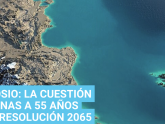Over 60 studies and presentations made by students, graduates, teachers and research teams from universities in Argentina, Brazil, Bolivia, Colombia, Panama and Venezuela were presented during the symposium “The Malvinas Question 55 years after Resolution 2065”, held on the anniversary of the United Nations historic declaration.
The opening of the Symposium was held on December 16th, on the 55th anniversary of UN General Assembly Resolution 2065 (XX), which was adopted in 1965 by a large majority and no negative votes, and which formally and expressly recognized the existence of a sovereignty dispute over the Malvinas, South Georgias and South Sandwich Islands and the surrounding maritime areas, calling Argentina and the United Kingdom to find a peaceful solution through bilateral negotiations.
At the opening table of the two-day virtual meeting, the Secretary of Malvinas, Antarctica and South Atlantic, Daniel Filmus, highlighted the importance of the participation and commitment of the academia in the design of a State policy on the Malvinas Question and emphasized the Argentine claim of sovereignty over the archipelago as a “cause of the Latin American Patria Grande (Great Homeland)”.
“The participation and commitment of the academia to the formulation of a State policy on the Malvinas Question is very important, and these meetings, dialogues and debates can make a huge contribution”, he underlined in the opening of the symposium, held together with the Secretary of University Policies, Jaime Perczyk, and the Executive Secretary of the Latin American Council of Social Sciences (CLACSO), Karina Batthyány.
During his intervention, Filmus stressed “the participation of 25 universities from across the country, as well as other Latin American nations, which reasserts the fact that Malvinas is a cause of the Patria Grande, that historically accompanied our claim and continues to do so ”.
The Symposium was organized in different panels according to six themes: Social Sciences, Legal Affairs, Economy, Natural Sciences and Environment, Military Conflict and Pedagogy. The papers presented will be compiled in a publication.
The studies and presentations come from 25 public and private universities and university institutes from across the country, such as the University of Buenos Aires (UBA), the University of La Plata (UNLP), the Argentine Catholic University (UCA), the National University of the Center of the Province of Buenos Aires (UNICEN), the National Technological University (UTN), the University of Salvador (USAL), the National University of Mar del Plata (UNMDP), the National University of Córdoba (UNC), the National University of Río Cuarto (UNRC), the National University of Cuyo (UNCUYO), the National University of Rosario (UNR) and the National University of Tierra del Fuego (UNTDF), among others. Also from the Central University of Venezuela (UCV).
The event was an occasion for researchers from across the country dedicated to training, research and extension on topics related to the Question of the Malvinas Islands to meet, dialogue and debate the formulation of a State policy on the subject.
The Malvinas Question is the oldest and most important matter in our country's foreign policy and it covers several issues. It is one of the last cases of colonialism pending resolution, as recognized by the United Nations General Assembly. It involves a matter of economic development and natural resources in relation to the South Atlantic and Antarctica.
The symposium was held five years after the first call for research projects known as “Malvinas at University”, a key milestone in the multidisciplinary approach to the Question of the Malvinas Islands.
In this sense, the call was aimed at bringing together, in a critical and reflective way, researchers from across the country and the region to address the main aspects of the Question of the Malvinas Islands, to resume the work done in the research proposals of 2015 and to achieve an updated critical mass to reflect on central issues in terms of development, sovereignty and cooperation, both for the country and the region.


